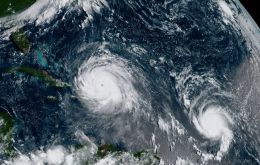MercoPress. South Atlantic News Agency
Tag: World Meteorological Organization (WMO)
-
Monday, September 22nd 2025 - 23:29 UTC
WMO Bulletin shows 2024 recovery of ozone layer, on 40th anniversary of UN Vienna Convention

The World Meteorological Organization Bulletin, WMO, reported that the low level of ozone depletion observed in 2024 was partly due to naturally occurring atmospheric factors, which drive year-to-year fluctuations. However, the long-term positive trend reflects the success of concerted international action.
-
Wednesday, April 2nd 2025 - 09:47 UTC
Glaciers melting rapidly call for action

The world has lost 5% of its ice volume over the past 20 years, with an annual melt of 273 billion tons, according to a recent study by the United Nations (UN) and the World Meteorological Organization (WMO). Regions like Europe (39% loss), the Caucasus and Middle East (35%), and New Zealand (29%) were heavily impacted as all 19 glacier regions globally lost mass in 2024 for the third consecutive year, with the 2022-2024 period marking the largest three-year loss ever, including 450 billion tons in 2022 alone.
-
Monday, May 13th 2024 - 10:55 UTC
LatAm and Caribbean hit hard by crises stemming from El Niño and climate change, according to WMO

The World Meteorological Organization (WMO) pointed out last week that Latin America and the Caribbean were going through a series of weather crises linked to the El Niño phenomenon and climate change. The current one in the Brazilian State of Rio Grande do Sul was one of the worst.
-
Friday, June 2nd 2023 - 10:59 UTC
Argentinian scientist becomes first woman to head WMO

Argentina's National Meteorological Service Director Celeste Saulo has been chosen to become the new Secretary General of the World Meteorological Organization (WMO), it was announced Thursday in Geneva.
-
Saturday, December 3rd 2022 - 08:11 UTC
Ozone hole makes third appearance over Argentine Patagonia in 2022

Argentine scientists warned this week about the possible consequences on people's skin stemming from the ozone hole positioning itself over the Argentine provinces of Santa Cruz and Tierra del Fuego, which is taking place for the third time in 2022.
-
Monday, November 7th 2022 - 10:00 UTC
World Meteorological Organization: Grim forecast at the launching of COP27

Earth's warming weather and rising seas are getting worse, with the situation deteriorating faster than ever, the World Meteorological Organization revealed in a new report.
-
Wednesday, May 11th 2022 - 08:59 UTC
World heading for warmest year on record in the next quinquennium 2022/26, WMO report

There is a 50:50 chance of the annual average global temperature temporarily reaching 1.5 °C above the pre-industrial level for at least one of the next five years – and the likelihood is increasing with time, according to a new climate update issued by the World Meteorological Organization (WMO).
-
Thursday, March 24th 2022 - 09:55 UTC
UN calls for early warning systems against extreme weather and climate change on World Meteorological Day

The UN set an ambitious five year deadline on Wednesday for countries to ensure that citizens worldwide are protected by early warning systems against extreme weather and climate change, the UN chief announced, marking World Meteorological Day.
-
Wednesday, December 15th 2021 - 09:11 UTC
WMO registers new Arctic temperature record, 38°C, in Verkhoyansk on 20 June 2020

A temperature of 38°C (100.4°F) in the Russian town of Verkhoyansk on 20 June 2020 has been recognized as a new Arctic temperature record by the World Meteorological Organization (WMO).
-
Saturday, February 8th 2020 - 11:31 UTC
Argentine base in Antarctica recorded the hottest temperature ever for the continent

A research base in the Antarctic has recorded the hottest temperature ever for the continent amid rising concern about global warming that has caused an increase in the melting of ice sheets around the South Pole.
